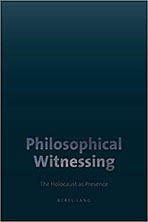Philosophical Witnessing: The Holocaust as Presence

Berel Lang
Fascinating philosophical inquiry into post-Holocaust representations of the Holocaust in political theory, ethics and aesthetics, and an assessment of the limitations and promise of philosophical ‘witnessing’ in relation to those issues
Reviews
“This is certainly the most perspicuous treatment of the philosophical issues arising in any effort to comprehend the Holocaust, in whatever terms, historiographical, artistic, moral, epistemological. Lang’s discussions of such topics as representation, silence, denial, and the relation among religious, philosophical, and historical analyses of the Shoah are startlingly illuminating, showing especially how they resist conceptualization in conventional philosophical terms. In his treatment of this topic, Lang inevitably brings under criticism modern Western philosophy’s inattention to events like the Holocaust. And he asks seriously whether Western philosophy can meaningfully address their most disquieting aspects.” —Hayden White, University Professor, Emeritus, University of California and Professor of Comparative Literature, Stanford University
“In this collection of essays Berel Lang reflects upon the role of the Holocaust in our thinking about language, silence, and representation, large themes in contemporary intellectual culture. With his customary sensitivity, patience and thoughtfulness, Lang invites us to consider old questions and new; he continues to be a voice of responsibility and great subtlety as we seek to come to grips with injustice and atrocity in our lives and to locate ourselves between language and silence, despair and hope. Lang is always attuned to ways in which contemporary issues, such as racism and group rights, exist for us in the shadow of Auschwitz and what that ought to mean to us as we try to cope with our world.” —Michael L. Morgan, Emeritus Chancellor's Professor of Philosophy and Jewish Studies, Indiana University
About the Author
Berel Lang's previous books include Act and Idea in the Nazi Genocide and Holocaust-Representation: Art within the Limits of History and Ethics. Since 2005, he has been Visiting Professor of Philosophy and Letters at Wesleyan University.
Book Specifications
Philosophical Witnessing: The Holocaust as Presence
Berel Lang
2009
256 pp.
978-1-58465-741-5
Book Review
Book Review by Jacob Howland, oxfordjournals.org